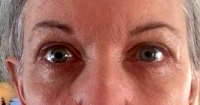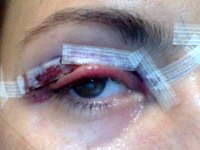Eyes after blepharoplasty
Closing eyes after blepharoplasty
During upper blepharoplasty the excess skin is removed. The goal is to remove the appropriate amount of exces skin and not to remove too much.
If too much is removed, it is possible that you would not be able to close your eyes. Plastic surgeons do everything possible, mainly using good judgement, to avoid this outcome.
In some situations, patients are swollen after surgery and this can impede complete closure of the eyelid. This resolves. (Tracy Pfeifer, MD, San Francisco Facial Plastic Surgeon)
Expect eye closure after blepharoplasty
A correctly performed upper blepharoplasty should result in good eye closure. Not uncommonly, mild swelling will result in a small gap (1-2 mm), but this should resolve quickly.
Permanent inability to close the eye is rare and a very serious complication.
There are various methods to perform this surgery, most requiring estimating amount of skin to resect.
My technique raises a meticulous flap which avoids the risk of lagophthalmos. (Corey S. Maas, MD, )
Blepharoplasty and eye closure
If the blepharoplasty is performed correctly, you should be able to close your eyes. It is when too much skin is removed does it become difficult to close. (Steven Wallach, MD, Manhattan Plastic Surgeon)
Blepheroplasty and closing the eyes
You would be able to close the eyes. If too much skin is taken then your eyes will not close and that is a major complication. The local anesthetic may affect the muscle some but you should be able to close the lids. (Samir Shureih, MD, Baltimore Plastic Surgeon)
Being able to close eyes after blepharoplasty
The local anesthesia will prevent normal eyelid closure during the surgery. That is whey I determine the amount of skin to be removed before the local anesthesia is given. one can determine that by pinching the upper eyelid skin with a fine forceps and marking the exact amount of skin that will be removed.
Doing that will prevent over resection of skin and the patient is able to open and close the eyes in the recovery room prior to discharge. The other thing that could affect the eye closure is the the amount of muscle resection. If this is overdone the upper lid closure will be week and the eye could remain open during sleep. I try not to remove any of the upper orbicularis muscle (the muscle responsible for the eye closure) or if I have to do it will remove minimally.
Being careful about skin resection and muscle preservation I have never had a patient who could not close the eyes after surgery. (Farhad Rafizadeh, MD, Morristown Plastic Surgeon)
With good technique, you can close your eyes easily after blepharoplasty.
Not being able to close your eyes after blepharoplasty is a very serious complication.
Good surgery prevents this by supporting the lower lids, and by not taking out too much skin. (George J. Beraka, MD (retired), Manhattan Plastic Surgeon)
Risk of eyelids not closing after blepharoplasty
It’s not uncommon for the eyelids to gap open by a millimeter or so immediately after UPPER eyelid surgery (due to swelling and probably some cautery dehydration of the wound), but this should resolve within hours to a day or two.
With LOWER eyelid surgery, this should never occur. If it does, immediate intervention is required.
The risk of a permanent problem with eyelid closure may be higher if upper lid surgery is combined with a browlift (forehead lift) at the same time, which is why I often like to stagger those procedures.
Careful pre-op measurement and marking of the patient is one key to getting a safe result that’s also aesthetically pleasing. (David C. Pearson, MD, Jacksonville Facial Plastic Surgeon)
You will be able to close your eyes after conservative blepharoplasty
Even when a Blepharoplasty (eye lid lift) is done conservatively with care to make sure that NOT too much skin is removed to preclude the touching / meeting of the lids over the globe – you may still have a temporary inability of closing your eyes completely (LAGOPHTHALMOS). This is usually due to temporary swelling and resolves rapidly.
It will not get better though if too much skin was removed (greatly shortening one or both eyelids), there is a tethering of the muscles lifting the upper lid or pulling down the lower lid or an injury to the nerve causing eyelid muscle contraction. This complication is very are. (Peter A. Aldea, MD, Memphis Plastic Surgeon)




